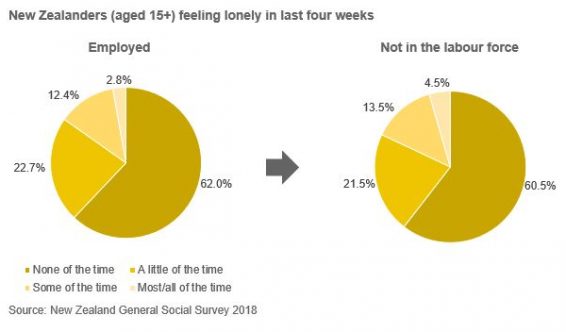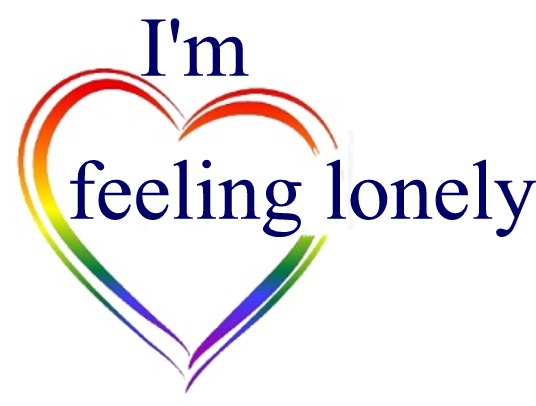Not in the workforce and lonely
In our society it is not uncommon for those in the workforce to cast judgement on the lives of working age people who are not in the workforce – and are not studying or actively looking for employment. In reality there are a multitude of reasons that brings young people and adults to be more or less permanently not in the workforce. With significant family or spouse support, some choose to be full-time homemakers and child-rearers. Others have struggled to find work and have given up; some are disabled or on a sickness benefit and no longer able to work; and some retire early and are the caretakers of relatives. And then there are those whose deeply personal circumstances have given them a false start, or major disruption in life and they just haven’t been able to move forward productively, or despite efforts have not been able to re-enter the workforce.
Our empathy is for those of you – regardless of your choices or circumstances that brought you to be full-time not in the workforce – that end up with significant loneliness. Whatever aspects of your life you did choose, loneliness was not one of them. Whatever your circumstances, spiraling downwards emotionally, will not help you move forward.
So if you are one of the many people who feels lonely as a result of not being in the workforce, or you know of someone who feels loneliness from this, then read on. In fact even if you suspect others might be lonely, and they stoically say they aren’t, it’s worth understanding not being in the workforce, and loneliness better.

Scratching the surface of being lonely
Just as you might find it hard to understand how people who have full time employment or absorbing study might be lonely, it’s also hard for them to really grasp how very lonely you might be: what it’s like:
Experiencing eternity
....every day just feels so long.
Being judged
...with what you do with your time.
Feeling envy
... of the people who do go out to work.
Feeling worthless
... not being able to contribute financially.
Not fitting in
... having no sense of belonging anywhere.
Not being in the workforce gives rise to many challenges with regard to feeling lonely...
… and in addition to these, you undoubtedly identify with many of the same loneliness problems that aren’t related to having no job or study.
Prevalence of loneliness
If you are not in the workforce and feel lonely, you are not alone.
For instance, versus those who are employed, you are 1.6 times more likely to feel lonely most/all of the time (i.e. 4.5% vs. 2.8% prevalence), and 1.1 times more likely to feel lonely some of the time (i.e. 13.5% vs. 12.4% prevalence).
So if, for whatever reason, you are not in the workforce and feel lonely, we empathise with you. Your predicament or chosen circumstances expose you to greater chances of loneliness.

Exposing loneliness
- For your skills and circumstances there are not jobs that pay enough to make participating in the workforce a financially viable choice.
- The person you are caring for is not able to contribute to meaningful conversation… baby, child, adult with a disability.
- Everyone else you know is in the workforce or studying so you are alone all day.
- Finances are really tight and you are not able to spend any money to enjoy your time not in the workforce.
- Your disability has left you with no choices for what to do with your life.
- You start losing friends because those who are working and studying socialise with others in a similar situation.

These are very real issues for you;
and some are not quick fixes! So despite these challenges it’s vital you actively find ways to ensure that you – and those around you – are emotionally healthy.
Exhibiting signs of being lonely
Solitude is very important for people to reflect and to come to grips with their situation. Being lonely for short periods is also not necessarily unhealthy. What we are considering is the type of loneliness which is prolonged and might be damaging to an individual’s health and wellbeing. Some people talk about their loneliness; other’s don’t. Some might not recognise that they are actually suffering from loneliness.
When people are already lonely, having people around you that you aren’t able to connect with on a deeper level, might even make your loneliness worse.
Research has shown that when socially isolated people aren’t getting enough regular human contact that can create problems with their family members and people who they do end up talking to.

This manifests behaviour such as:
- Picking fights with the person you are looking after, or the other family members who do go out to work or study.
- Forming addictions… online gaming, alcohol, drugs…anything that helps you forgot the numbing boredom and loneliness.
- Disengaging from conversation with friends and family who keep asking you about what you are going to do with your life.
- Losing all motivation that it becomes too hard to do anything to contribute in the household.
- Physically staying indoors finding it harder and harder to leave the house.
- Being taken advantage of and putting up with abusive behaviour because you feel disempowered.
These are just the surface of the ways you might be showing signs of being lonely… and that you could recognise in others.
So where to from here?
Conquering loneliness
We appreciate…
you all have a unique story.
How long you have been lonely; What you believe causes your particular loneliness; and what you have already tried to alleviate the loneliness.

To get to the heart of your loneliness we would like to get to know you!
Your personality, your eccentricities, and your values are all part of what makes you feel your loneliness more than some others.
Your next step
We appreciate the trust you would place in us to talk openly and frankly – so we promise no judgements – genuine empathy, respect and confidentiality.
Then when we have understood you better, we can help you move forward. Help you form better connections with your spread out communities, with your friends and your families…wherever they are in the world.
If you are ready to take the next step, click the button to get started addressing your loneliness:
People feel lonely for many reasons. To learn more about other at home and lonely categories, select one of the coloured boxes below, or scroll down the “I’m feeling lonely” menu.

With our help you can conquer your loneliness by taking better care of your inner self.
And we can conquer loneliness in New Zealand by better understanding and accepting each other.
So when you are ready…click here.
We look forward to hearing your view of the world!
